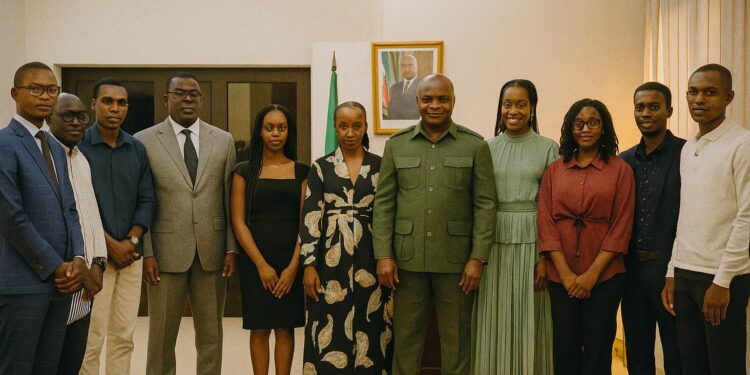Congolese Laureates Embark for Tech4Good
The runway at Maya-Maya Airport bore witness this week to an image still rare in Central Africa: a cohort of coders and engineers boarding an intercontinental flight with the explicit mandate of defending their nation’s colours in a technological arena. Selected from a pool of 380 applicants, the ten laureates of the Denis Sassou Nguesso Digital Innovation Prize have now set course for Dongguan and Shenzhen, where Huawei’s Tech4Good global finals will unfold. Minister of Posts, Telecommunications and the Digital Economy Léon Juste Ibombo, flanked by senior officials, framed the send-off as both a celebration of individual merit and an exercise in soft-power projection.
Digital Diplomacy with Chinese Characteristics
The People’s Republic of China has, for well over a decade, refined its pledge to share technological know-how with African partners. Within that constellation of initiatives, Huawei’s Seeds for the Future programme stands out for its longevity and multilayered curriculum. Since 2008, more than 15,000 students worldwide have passed through its bootcamps, and Brazzaville joined the roster in 2015. Officials in both capitals routinely describe the collaboration as ‘mutually beneficial’, a phrase that resonates with Congo’s strategic objective of diversifying an oil-centric economy. While critics in Western think tanks sometimes caution against dependency, Congolese policymakers view the partnership through a utilitarian lens, emphasising skills transfer over geopolitics. In the minister’s own words, the venture ‘consolidates a win-win relationship that enhances our digital sovereignty’.
Seeds for the Future and National Strategy
Brazzaville’s digital road map, codified in the Plan National de Développement 2022-2026, identifies human capital as the linchpin of economic transformation. The Denis Sassou Nguesso Prize, launched in 2021, operationalises that vision by rewarding prototypes with demonstrable social utility. The ten current delegates embody a cross-section of priorities: fintech, agritech, e-health and data management. According to internal figures from the Ministry of the Digital Economy, prize alumni have already raised the equivalent of three million US dollars in seed funding since the award’s inception, a modest yet encouraging signal in a market historically starved of venture capital.
From Tacit Knowledge to Market Solutions
Among the projects poised to capture attention in Shenzhen is Citex, designed by Ruth Dzio, a graduate of the inter-state Congo-Cameroon University. Citex targets a problem seldom romanticised in development discourses: the haemorrhaging of implicit corporate knowledge as staff rotate or retire. By converting tacit processes into searchable, explicit datasets, the platform promises to lengthen the life cycle of intellectual capital in Congolese enterprises. Industry observers note that comparable solutions in mature markets can reduce onboarding costs by up to thirty percent, suggesting a tangible productivity dividend should Citex scale successfully. Dzio herself is cautious but optimistic, arguing that ‘local context is our moat; foreign software rarely accounts for our linguistic and infrastructural specificities’.
The other finalists bring similarly pragmatic prototypes: a low-bandwidth telemedicine suite for semi-urban clinics, a sensor-driven irrigation dashboard for cassava farmers and a mobile wallet integrating Congolese franc and Central African CFA settlements. Each responds to structural bottlenecks acknowledged in World Bank diagnostics, namely limited connectivity outside major hubs and a banking penetration rate below fifteen percent.
Prospects for a Home-Grown Innovation Ecosystem
The symbolism of dispatching a youth delegation to the nerve centre of Chinese hardware production is not lost on regional analysts. Shenzhen epitomised manufacturing ambiguity four decades ago; today it functions as a living case study in state-supported entrepreneurship. Congolese officials hope the immersion will imprint a similar ethos on their delegates, who are expected to return as informal ambassadors for a nascent tech community back home. Impressions gathered during prior editions support that expectation: alumni frequently incubate start-ups at Brazzaville’s 242 Hub and liaise with the Congolese Agency for the Development of the Digital Economy to fast-track regulatory clearance.
Sceptics raise legitimate questions about scalability in an energy grid prone to load shedding, yet data from the African Development Bank indicate incremental improvements in electrification, particularly in urban corridors. Conversely, the demographic dividend—over sixty percent of Congolese are under twenty-five—offers a reservoir of digital natives eager to test entrepreneurial waters provided that bandwidth and credit lines expand concomitantly. In this calculus, the Tech4Good challenge serves less as a trophy hunt and more as a laboratory for reciprocal learning.
Navigating the Road Ahead
Whether these innovators return with medals or merely memories, their sojourn carries diplomatic, economic and societal weight. It affirms Congo-Brazzaville’s commitment to harnessing fourth-industrial-revolution tools for inclusive growth, an agenda reiterated by President Denis Sassou Nguesso at recent multilateral fora. It also signals to multinationals that the Congolese market, though modest in purchasing power, is committed to nurturing talent pools able to co-create solutions rather than merely consume them. As the delegation settles into Huawei’s campus dormitories, stakeholders from Brazzaville to Beijing will be watching, mindful that the outcome could either validate current policy calibrations or prompt a strategic rethink.
For now, optimism remains the prevailing sentiment. Minister Ibombo’s parting injunction to the delegates—‘Surpass yourselves for your country’—captures a wider national aspiration: to convert raw ambition into scalable ventures that speak both the language of code and the idiom of development. The runway scene has faded, yet the journey it inaugurated may well shape the next chapter of Congo’s digital narrative.












































